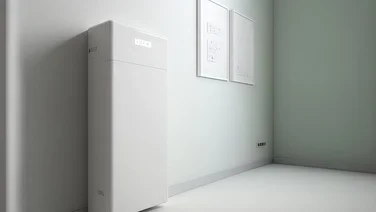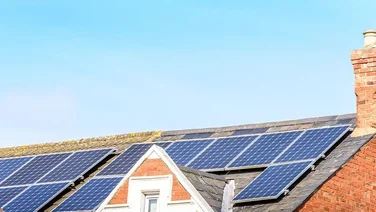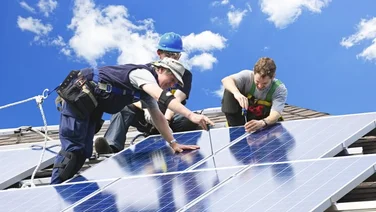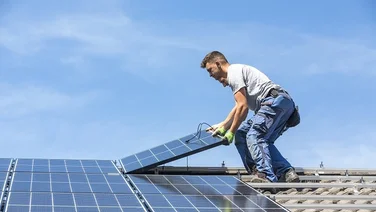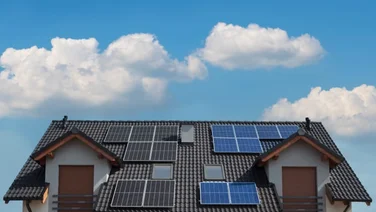We receive a small fee from trusted installers when you request a quote through our site. This helps us keep our content independent, well-researched and up to date – Learn more
- What is a solar panel optimiser?
- What are the different types of solar panel optimisers?
- How much does a solar panel optimiser cost?
- Pros and cons of solar panel optimisers
- Are solar panel optimisers worth it?
- Do solar panel optimisers require any maintenance?
- Are there any alternatives to solar panel optimisers?
- Next steps
- A solar panel optimiser helps maximise the efficiency of solar panels
- There are two main types: DC optimisers and smart solar panels
- Micro-inverters are an alternative, but pricier, option
If you’ve been considering installing solar panels on your home or business, it’s important to consider first and foremost how much you could save. Enter solar panel optimisers.
But what exactly are solar panel optimisers and how do they work?
In this article, we’re going to explore the advantages of using solar panel optimisers and why they’re a smart investment.
But if you’re already curious about how much it would cost to give your home an eco-friendly power boost, we make it easy for you to compare solar panel quotes – simply share a few details with us and our expert team will handle the rest.
Where do you want to install solar panels?
Get started
What is a solar panel optimiser?
A solar panel optimiser is a device that helps maximise the efficiency of your solar panels by individually optimising the output of each panel.
Imagine your solar panel system as a sports team. Usually, if one player (well, panel) has an off day where it’s shaded or a bit crusty, the entire solar team’s output and performance will dip. But what if you could give each player a personal coach to make sure they’re always on their A-game, no matter what?
That’s what a solar panel optimiser does. It’s a clever gadget strapped onto each solar panel, tweaking and adjusting things to ensure each one is always putting its best foot forward.
The result? Your solar system scores more power, no matter the conditions.
How does a solar panel optimiser work?
A solar panel optimiser works by using Maximum Power Point Tracking (MPPT) technology.
Every solar panel has a point, called the maximum power point, where it generates the most electricity. This point can vary because of factors like temperature and shading – but the optimiser constantly adjusts the voltage and current of its respective solar panel to keep it operating at this maximum power point.
This optimisation ensures that, even if some panels are underperforming because of external factors, the rest of the panels in the array aren’t negatively affected and can continue to generate electricity at their peak efficiency.
What are the different types of solar panel optimisers?
There are two main types of solar optimisers out there – DC optimisers and smart solar panels.
Let’s start with DC optimisers. There are different types of solar panels but we add these smart devices onto traditional solar panels. They work like mini power stations, optimising DC electricity from each panel before it gets converted to AC electricity.
DC optimisers are classed as module-level power electronics (MLPEs) – a term for optimisers attached to each individual solar panel. Meanwhile, smart solar panels have optimisers built right into them, with no add-ons needed, so you get optimised solar energy straight out of the box.
Both types help your solar array perform better, but their suitability depends on factors like your setup’s size, location, and shading conditions.
Which type of solar panel optimiser is right for you?
Choosing the right solar panel optimiser boils down to your energy needs, budget and long-term goals.
If you’ve already got traditional solar panels and want to boost their performance, DC optimisers are a great (retro)fit. But if you’re starting from scratch or updating your system, consider smart solar panels with built-in optimisers, offering an all-in-one solar solution.
Ultimately, it’s always a good idea to talk to a professional who can help you figure out which type of solar panel optimiser will give you the best efficiency and output for your system.
How much does a solar panel optimiser cost?
| Household size | Average number of solar panels | Estimated DC optimiser cost | Estimated smart solar panel cost |
|---|---|---|---|
One-bedroom flat | 3 | £120 | £540 |
1-2 bedroom house | 6 | £240 | £1,080 |
3 bedroom house | 10 | £400 | £1,800 |
4-5 bedroom house | 14 | £560 | £2,520 |
The cost of solar panel optimisers in the UK can vary widely, primarily depending on the brand, type, and the number of panels in your array. In the table above, we’ve looked at the average number of panels needed for a typical household size.
As a rough estimate, you might expect to pay around £40 per DC optimiser, including installation if it’s your first time buying panels. For smart solar panels, you can expect to pay around £180 per panel.
Remember that while this can increase the upfront cost of your solar system, the improved efficiency often means better returns in the long run.
Pros and cons of solar panel optimisers
- Increased efficiency
- Overcome the impact of shading or debris
- Enhanced module-level monitoring
- Built-in safety mechanisms
- Additional cost
- Complex installation or retrofitting
- Maintenance and potential replacement costs
- Limited compatibility
Solar panel optimisers are a brilliant addition to a solar PV system for those seeking high efficiency, in less-than-ideal conditions. Plus, some models offer enhanced safety features and allow you to monitor the performance of each panel individually.
Using optimisers could also help lower the average electric bill in the UK.
However, while the pros are indeed appealing, there are some downsides. The upfront costs, including the price of the optimisers themselves and potentially more complex installation or retrofitting, can be considerable.
It’s also crucial to ensure that the optimisers you choose are compatible with your specific panels and inverter. Not all panels and inverters may be compatible with all optimisers.

Are solar panel optimisers worth it?
Picture this: your solar panels are working hard, but one’s under a tree’s shadow or obscured by an insane amount of bird poo. Without optimisers, your entire system slows down – but with them, every panel is pulling its weight, come rain or shine.
Yes, there’s an upfront cost, and it’s more kit to look after. But the power boost and peace of mind? That could easily make it worth your while. It’s well worth considering as a strategic investment in your solar setup.
Do solar panel optimisers require any maintenance?
Solar panel optimisers are designed to be low maintenance, much like the solar panels themselves. Once installed, they work quietly in the background to optimise your solar energy production.
That said, as they are electronic devices, there’s always a chance of issues or failures. This is where their monitoring feature comes in handy – it allows you to track the performance of individual panels, so if an optimiser isn’t working correctly, you’ll be able to spot it quickly.
Any maintenance or repair would typically involve a solar technician diagnosing and replacing the faulty unit. Always consult with your solar provider regarding specific maintenance procedures.
Are there any alternatives to solar panel optimisers?
If you’re not quite sold on solar panel optimisers, you’ve got a couple of other options.
The most straightforward one is to go “old school” via a traditional solar system with a central (or string) inverter. It’s a simpler setup, but remember, if one panel underperforms (maybe it’s a bit shaded), the entire system takes a hit.
Another option is micro-inverters. These clever little MLPE devices not only optimise each solar panel’s power output but also convert the electricity from DC to AC right there on the spot.
Micro-inverters are a pricier option, costing between 10-30% more than a standard central inverter, but they give you maximum energy production and design flexibility.
Next steps
Solar panel optimisers can ramp up your solar power game by helping each panel perform its best, regardless of any weak links. They’re a little more cash upfront, but the potential gains could be worth it.
Want to explore further? Your best bet is to chat with one of our friendly solar experts – we can help you find the right match for your home and budget.



